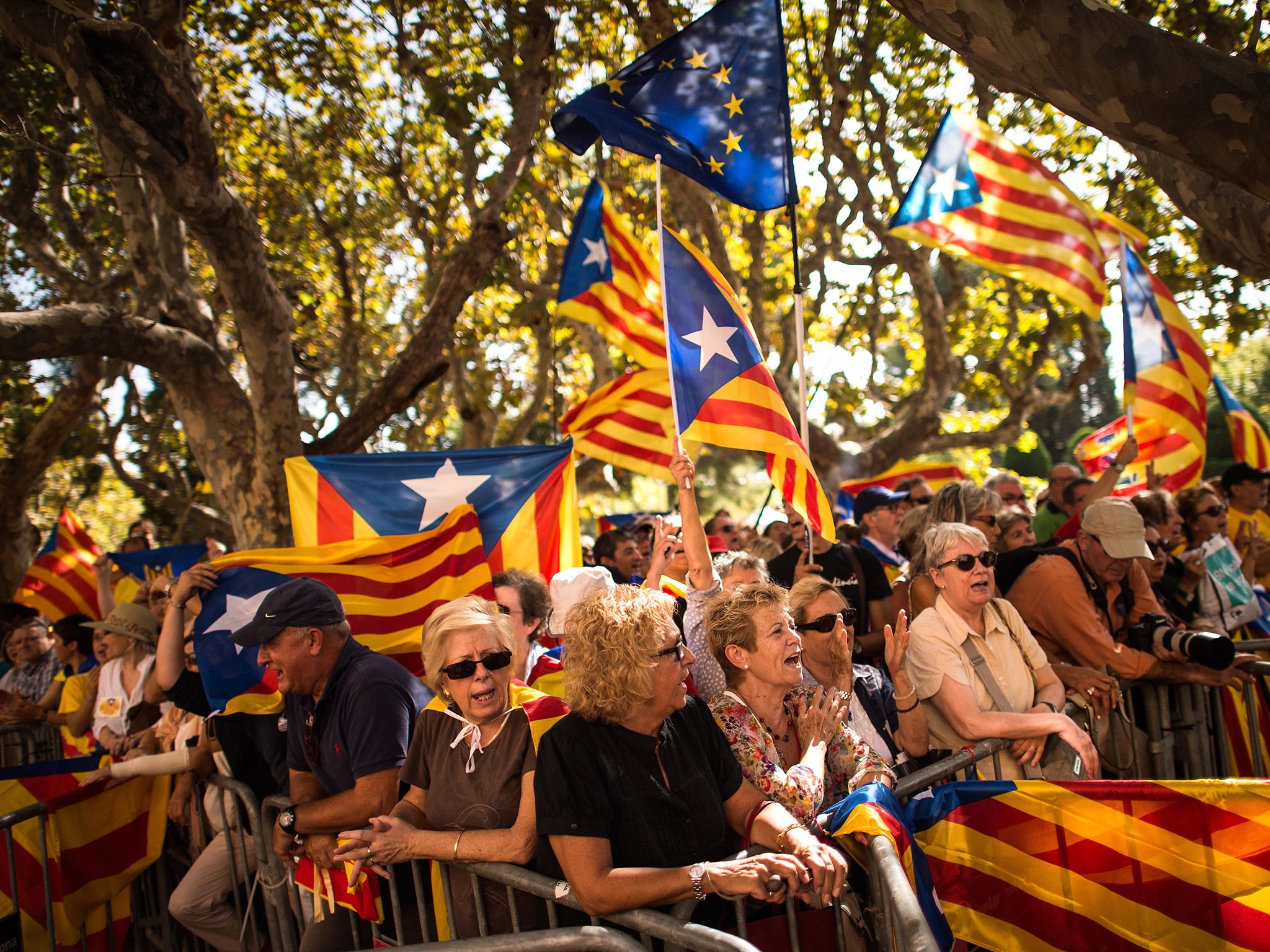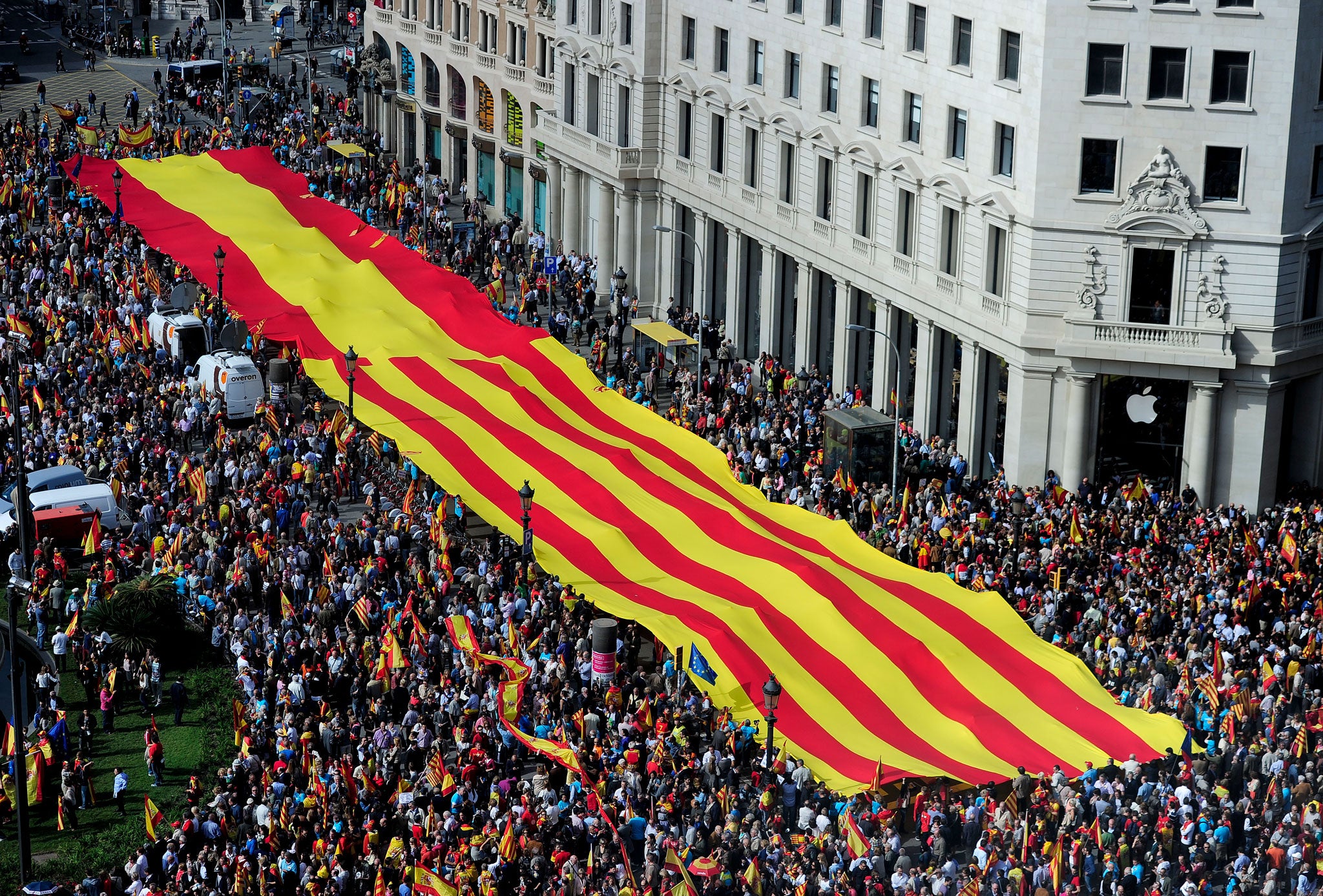Catalans press on with independence hopes, despite Scotland's No vote
Region hopes to force referendum on leaving Spain

Your support helps us to tell the story
From reproductive rights to climate change to Big Tech, The Independent is on the ground when the story is developing. Whether it's investigating the financials of Elon Musk's pro-Trump PAC or producing our latest documentary, 'The A Word', which shines a light on the American women fighting for reproductive rights, we know how important it is to parse out the facts from the messaging.
At such a critical moment in US history, we need reporters on the ground. Your donation allows us to keep sending journalists to speak to both sides of the story.
The Independent is trusted by Americans across the entire political spectrum. And unlike many other quality news outlets, we choose not to lock Americans out of our reporting and analysis with paywalls. We believe quality journalism should be available to everyone, paid for by those who can afford it.
Your support makes all the difference.Catalonia’s drive to break away from Spain gathered pace when the regional parliament in Barcelona looked set to vote for a bill permitting a non-binding independence referendum on 9 November. Some predictions suggested that nearly 80 per cent of MPs would vote in favour.
Despite the blow hours earlier of the No vote in Scotland – Catalans had hoped that Scotland would provide a blueprint for a secessionist region to join institutions such as the European Union – the determination of Catalans to hold a poll on their own future seemed undimmed.
Although the new Catalan law will not be effective until it is formally placed on public record, Spanish Prime Minister Mariano Rajoy and his ruling Partido Popular (PP) government in Madrid are adamant the referendum is unlawful under Spain’s constitution.
As soon as the Catalan referendum law is published, a cabinet meeting is expected to be held in Madrid, which will discuss the definitive version of the appeals Madrid will lodge against the law in Spain’s Constitutional Court.
At that point, perhaps as early as next week, the Catalan legislation will almost certainly be suspended, pending a final court verdict.
Once these set piece legal manoeuvres have been carried out, Catalan President Artur Mas is expected to summon all those political parties in favour of the referendum to discuss what action can be taken.
In Madrid, Mr Rajoy praised the outcome of the Scottish referendum, saying Scotland had avoided the “grave economic, social, institutional and political consequences that would have resulted from its separation from the United Kingdom and Europe”. To ward off Catalan ambitions, Mr Rajoy’s government had been expected to be an independent Scotland’s biggest obstacle to immediately joining a number of European bodies.
But Catalan nationalists insist that the No vote in Scotland has not removed any wind from their sails, as the legal and political showdown with Madrid looms ever closer.
"Scotland has shown the way to others - the Catalan process continues," Mr Mas said this morning. “What separates us [from Scotland] is not being able to vote.”
“Obviously a Yes vote would have been the best for the Catalan nationalists,” Germà Capdevila, a political columnist and the editor of the Catalan magazine Esguard told The Independent, “because it would have forged a path for them to follow."

“But the positions here are so entrenched. Spain will continue to say Scotland has nothing to do with Catalonia; the Catalans will say it’s all a question of democracy.
“I expect the Catalan referendum legislation will be designed to make it as hard as possible to attack in the courts, and the Spanish government will find a way of appealing against it regardless.”
Oriol Junqueras, leader of the left leaning pro-nationalist ERC party, argued recently that civil disobedience would be one option should the referendum be vetoed. But his more conservative allies in CiU, Mr Mas’ powerbase, instantly shunned the idea, and two polls in Catalonia recently showed that relative majorities believe the referendum should not go ahead if it was declared illegal.
Meanwhile a Spanish judges’ association has claimed that organisers of an illegal referendum could face up to 15 years in prison, while earlier this week Spain’s Foreign Minister Jose Manuel García-Margallo refused to rule out the suspension of Catalan autonomy, if needed, to prevent the referendum from happening.
When asked - ironically - by one Basque Nationalist MP if he also refused to rule out sending in tanks, Mr Margallo tartly responded: “I don’t believe that’s possible according to our constitution.”
Join our commenting forum
Join thought-provoking conversations, follow other Independent readers and see their replies
Comments